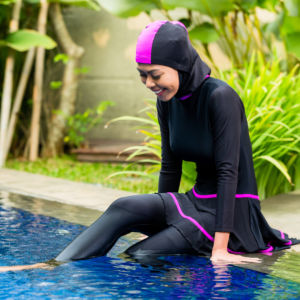Burkini bans stave off ‘Submission’ for one more day.
Michel Houellebecq’s Submission, the best of the highbrow hell-in-a-hand-basket novels, hits me as undeniably oracular. Witnessing European slide toward submission, a culture war in violent fits and spurts, we might wonder what’s sacred anymore: What desecrated symbol could ever spark sufficient backlash to ignite the full force of the French fighting spirit? In Prime Minister Manuel Valls’s denunciation of the ultra-modest burkini, a swimsuit designed for Muslim women, and the mayor of Cannes, where it’s been banned, we may have our answer.
As the AFP reported—
On Wednesday, Prime Minister Manuel Valls waded into the debate, saying the garment was “not compatible with the values of France and the Republic” and that he supported towns that banned it.[…]
Valls cited the tensions in France after a string of jihadist attacks — including July’s truck massacre in Nice — for backing mayors who barred a garment “founded on the subjugation of women”.
The burkini, which covers the body and hair, is a “provocation” that risks causing “public disorder”, he told La Provence daily, echoing the mayor of Cannes, where three women have been fined 38 euros ($42) for sporting the swimsuit.
Such an affront to religious liberty would never fly in this country. But the French way, born from the Enlightenment, is something else: laïcité, secularism, is a cornerstone of public society ordained via strictures perhaps effectively puritanical in their own right. French parliament banned the most modest Muslim covering a woman can wear, the burqa, in 2010. And now we have Prime Minister Valls calling the burkini a symbol of a murderous, militant “delinquent Islam” that promotes “the enslavement of women.” The veiled woman, whatever her motive for covering up, is a vestige of an unenlightened, pre-modern piety: At least in theory, it’s a man who keeps her hidden.
Here, I have to think of four Muslim sisters I know: Their mother wears a traditional cloak and a head covering, but none of her daughters do, and they never will—even now that the second eldest is married. The daughters went to college in the west and attended an International Baccalaureate girl’s school in their hometown of Amman, Jordan, all the while keeping in close touch with their cousins in Connecticut. And their mother, however modestly, loves to list off the accomplishments of the four thoroughly modern women she brought up.
Yes, cultural assimilation is crucial to national security—particularly in France, particularly now. And details, such as what a woman wears to the beach, matter. But at least in thinking of my friends, it also seems the French are forcing generational progress on their immigrant population, and how can we blame them?
Westernization of the sort I witnessed among these women, anyway, brings too many gifts—not least among them, the sea breeze in your hair and the sun on your salty skin.

